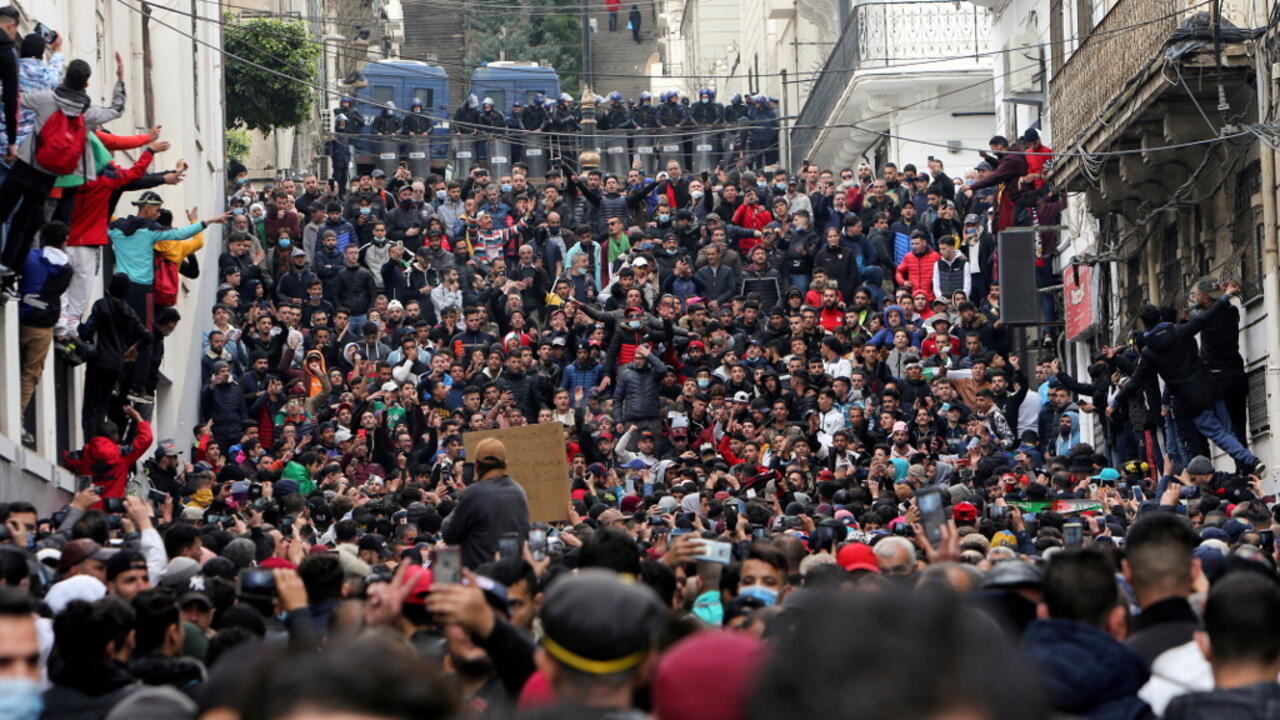Algeria: three years later, what remains of the Hirak?
Demonstrators take part in a demonstration in Algiers, to mark the second anniversary of Hirak, the mass protest movement calling for political change in Algeria, February 22, 2021. © REUTERS / Ramzi Boudinar
Text by: Magali Lagrange Follow
3 mins
On February 22, 2019, a major protest movement began in Algeria, first against the candidacy of President Abdelaziz Bouteflika for a fifth term, then against the system in power.
The Hirak resulted in the departure of the former head of state (who died last September), after 20 years at the head of the country.
But the disputed presidential election organized at the end of 2019 did not put a stop to the disputes.
Advertising
Read more
The first observation is that the weekly marches no longer take place.
Finished, the images of crowds in the streets of Algiers, and other cities of the country, which we saw circulating every Friday on social networks, at the start of the protest movement.
During these marches, slogans were chanted by the demonstrators to call for a total change in the system at the head of the Algerian state, and to switch to a civilian rather than a military regime.
These peaceful marches stop in March 2020, due to the coronavirus pandemic.
After almost a year of interruption, an attempt to resume took place in February 2021. But
these demonstrations were repressed in the capital Algiers
, as in other cities in the country.
The gatherings are dispersed by the security forces and numerous arrests take place.
Last May, the Algerian government imposed new rules.
All events must now be the subject of a prior declaration, on which must in particular be specified its route, its start and end times, as well as the identity of the organizers.
Claims still present
However, is the Hirak over?
“
If we sum up the Hirak to the grandiose marches, it is finished.
But if we take into account its demands – such as the transition to a democratic rule of law – it is still relevant
,” said law professor Mouloud Boumghar.
For him, the crisis of legitimacy persists.
Moreover, the polls organized since the birth of the protest movement have all recorded low participation rates.
President Abdelmadjid Tebboune, elected in December 2019, had promised a revision of the Constitution, with which the Algerian power intended to meet the expectations of Hirak and the construction of a "new Algeria".
The referendum organized in November 2020 recorded a historically low participation rate, at 23%, as did the early legislative elections of last June, boycotted by part of the opposition, and which saw a traditional party, the FLN, come out on top. .
The local elections recorded a turnout of 35%.
The response given by the Algerian power to the aspirations of the “authentic blessed Hirak”, according to the consecrated expression, therefore did not convince.
Escalation of repression
The date of February 22 was decreed "national day of brotherhood and cohesion between the people and their army for democracy" by the Algerian president.
Yet, as each anniversary of the start of the Hirak approaches, human rights organizations are now denouncing increased repression.
The national committee for the release of detainees estimates that there are more than 300 prisoners of conscience in Algeria today.
Some remain in pre-trial detention
for many months, awaiting trial.
The LADDH (Algerian League for the Defense of Human Rights) asked for their release a few days ago.
At the beginning of the month, Amnesty International also recalled that a political party (the PST) has been suspended, and that two others (UCP and RCD) are threatened with the same fate.
These are three political parties that play an active role in the Hirak.
In addition, a political leader (Fethi Gares, the MDS coordinator) was sentenced to two years in prison for speaking out against the repression.
Amnesty International believes that “
the Algerian authorities want to stay in power at all costs and are trying to crush their opponents by trampling on the rights to freedom of assembly, association and expression.
»
For Mouloud Boumghar, “
the escalation in repression is changing the nature of the regime, which is now carrying out a methodical repression of the Hirak.
And if he does it, it is because he knows that the demands he is making are still alive within Algerian society.
»
Newsletter
Receive all the international news directly in your mailbox
I subscribe
Follow all the international news by downloading the RFI application
google-play-badge_FR
Algeria

